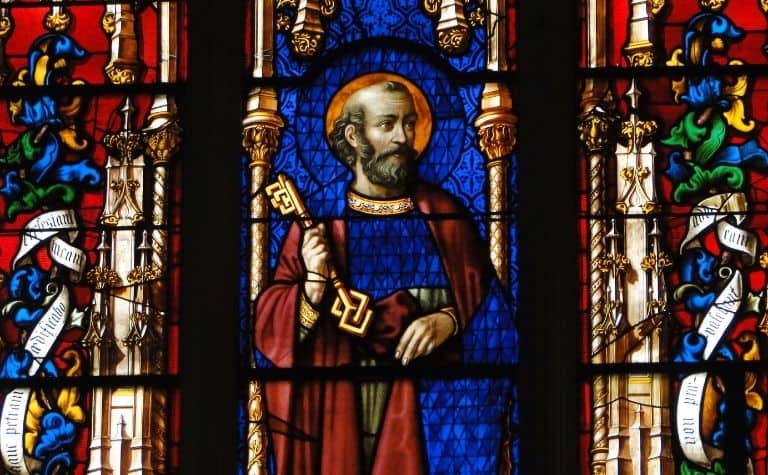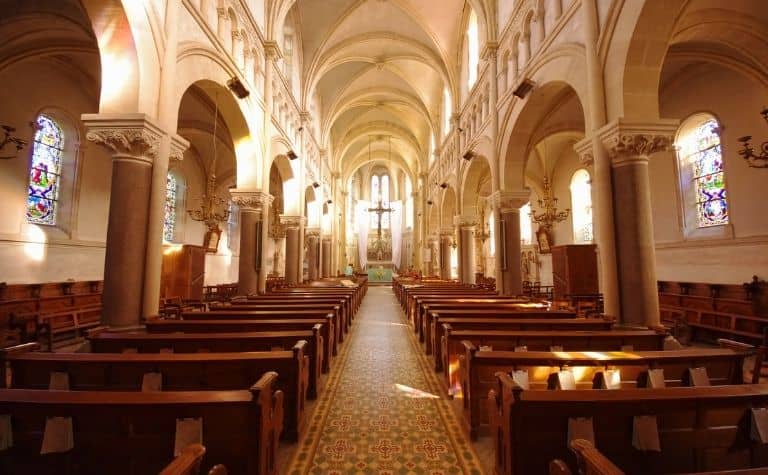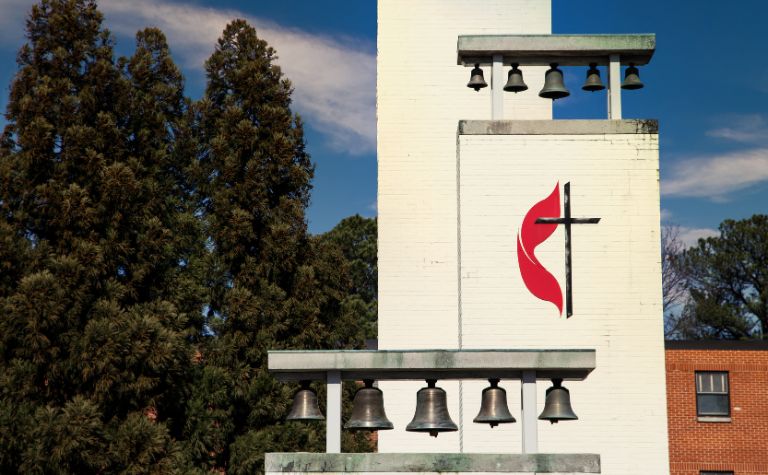Throughout history, Methodists have been intentional about how they approach their faith. One of the ways they do this is through reciting creeds such as the Apostles’ Creed. Some might ask: why do Methodists say the Apostles’ Creed?
Methodists say the Apostles’ Creed because it expresses the fundamental beliefs of Methodism and shows unity with the rest of the Christian church. Traditionally, Methodist churches say the creed during a baptism to provide context for the faith community to which the infant now belongs.
What exactly is the Apostles’ Creed, and what is the Methodist understanding of the phrase the “holy catholic church?” What other major Protestant denominations say the Apostles’ Creed, and are there any differences between the versions they profess? Read on to learn answers to these essential questions.

What Exactly Is the Apostles Creed?
The Apostles’ Creed is the oldest and simplest confessional creed of the Christian church. Sometimes broken up into twelve parts, a legend arose that a different apostle wrote each part early on. By the Middle Ages, the Christian church no longer thought this was true. (Also see Methodist vs. Catholic: What’s the Difference?)
The Apostles’ Creed, in its current form, likely originated in Gaul in the fifth century. This creed modified the Old Roman Symbol (also known as the “Old Roman Creed”), which has its roots in the fourth century. The Old Roman Symbol originates from a late second-century rule of faith that early Christians used as a baptismal rite.
The Apostles Creed
I believe in God, the Father almighty,
creator of heaven and earth.
I believe in Jesus Christ, his only Son, our Lord,
who was conceived by the Holy Spirit
and born of the virgin Mary.
He suffered under Pontius Pilate,
was crucified, died, and was buried;
he descended to hell.
The third day he rose again from the dead.
He ascended to heaven
and is seated at the right hand of God the Father almighty.
From there he will come to judge the living and the dead.
I believe in the Holy Spirit,
the holy catholic* church,
the communion of saints,
the forgiveness of sins,
the resurrection of the body,
and the life everlasting. Amen.
If someone professed the doctrines of this rule of faith, the church leaders were willing to baptize them into the faith. Although the specific wording of the Apostles Creed does not originate from the apostles, the early versions of this creed sprang to life only one or two generations after them. Because of this, the Apostles’ Creed is one of, if not the most, ancient Christian creeds. [1]
The content of the creed centers around God the Father, the Son, and the Holy Spirit. Unlike the Nicene Creed, the Apostles’ Creed avoids a detailed theology of the Trinity. There is no mention of the exact nature of Jesus Christ besides the things he has done and is doing. (Also see Do Methodists Wear Crosses?)
The Creed does not answer what Jesus accomplished by dying on the cross. However, the Apostles’ Creed does emphasize Jesus’ resurrection and the future resurrection of the dead.
This simplicity has allowed it, for the most part, to avoid controversy in the church. All major Christian denominations use it at some level, either in church services, devotionally, or as a statement of faith.
In contrast, some debate has surrounded another ancient statement of faith: the Nicene Creed. This Creed provides a more detailed understanding of each person of the Trinity.
For example, instead of simply listing the things that Jesus has done, the Nicene Creed explains the exact nature of the Son’s relationship to the Father: he is eternally begotten, not made.
One detail in the Nicene Creed concerning the Holy Spirit was a contributing cause of the great schism that split the Eastern Orthodox Church from the Roman Catholic Church. (Also see What Do Methodists Believe About Heaven?)

How do Methodists Understand “Holy Catholic Church”?
Methodists and many other Christians use the word “catholic” to refer to the universal church rather than the Roman Catholic Church, a historic branch of Christianity. The word comes from combining two Greek words that mean “through the whole.”
Thus, when Methodists say in the Apostle’s Creed that they believe in the “holy catholic church,” they say they believe in the Christian church worldwide and throughout history.
Time and location do not limit the legitimacy and legacy of Christian practices and belief systems. Methodists believe that sex, gender, or skin color prevent someone from being part of a Christian community; one church exists in the sight of God. (Also see Methodist vs. Baptist: What’s the Difference?)
Historically speaking, The Apostles’ Creed and other creeds developed around the same time were written partly due to the Edict of Milan in the early 4th century. This law mandated religious toleration and declared persecution because of someone’s faith illegal.
For the first time, communities of Christians worldwide could freely meet and talk to one another about their faith and experiences. Inevitably, disputes arose, and, in response, Christian leaders formulated creeds such as the Apostles’ Creed and the Nicene Creed. (Also see Do Methodists Speak in Tongues?)
Most Christians accept the Apostles Creed as doctrinally true, making it one of the most unifying doctrinal statements in the Christian church. This cannot be as easily said about the Nicene Creed, which has been disputed more often by certain denominations. [2]

What Other Protestant Churches Say the Apostles Creed?
Most Christian denominations accept the Apostles Creed as theologically true. However, only the more liturgical denominations generally profess the creed during church services. These denominations include Catholics, Lutherans, Anglicans, and Presbyterians. (Also see Methodist vs. Anglican: What’s the Difference?)
Several of these denominations use the Apostles Creed during baptism, as do Methodists and the early church. A person must believe it is the bare minimum to call themselves Christian. [3]
Although all these denominations believe in a similar version of the creed, some church leaders and traditions have disputed certain parts.
For instance, some churches replace the “holy catholic church” with the “universal church.” They do this to prevent people from thinking that using the word “catholic” implies support for the Roman Catholic Church.
Others dispute a line of the creed that claims God descended into hell after dying on the cross. According to their reasoning, 1 Peter 3:18-20 does not provide adequate biblical evidence for this claim.
The passage reads, “For Christ also suffered once for sins, the righteous for the unrighteous, that he might bring us to God, being put to death in the flesh but made alive in the spirit, in which he went and proclaimed to the spirits in prison, because they formerly did not obey, when God’s patience waited in the days of Noah, while the ark was being prepared, in which a few, that is, eight persons, were brought safely through water.”
Other groups of Christians avoid reciting the Apostles Creed not because they are at odds with it theologically but because they disagree with using creeds altogether.
People of this persuasion tend to emphasize the priesthood of all believers and the danger of trusting any church authority or council to interpret Scripture for them. (Also see What Bible Translation Do Methodists Read?)
They claim that Bible, not any creed or council, should be the ultimate authority in a person’s life. One rebuttal to this claim is that almost all churches, whether they accept creeds or not, often have a statement of faith that operates similarly to a creed.
References:
[1] Source
[2] Source
[3] Source
Related Questions
Methodism is a prominent branch of Protestant Christianity that dates to the mid-18th century. Pentecostalism is a movement within Protestantism that originated in the early 20th century. What's the...
Methodism and Lutheranism are two of the most influential Protestant Christian denominations. Many of their core beliefs are the same, yet they also have critical theological...
